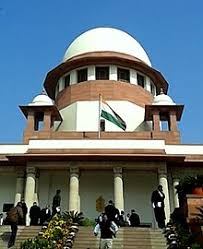The crux of these appeals lies in a property dispute wherein one of the two brothers namely, Faqir Singh had allegedly sold off the portion of property belonging to him that his brother Gurbachan Singh and he inherited from their father namely Suchet Singh who died intestate in the year 1942. Gurcharan Singh (Respondent herein/plaintiff) bought a piece of land belonging to Faqir Singh measuring 4 marlas vide sale deed dated 19th December, 1978[Hereinafter referred to as “disputed property”] for a consideration of Rs. 6000. Thereafter, he was put in possession of such land however, it was forcibly taken by the Appellant Gurbachan Singh who stated that since Faqir Singh did not have any exclusive title or possession over the suit property, he could not purport to sell the same. (Para 2)
The Respondent (Gurcharan Singh) filed a suit for possession over such disputed property before the SubJudge 1st Class, Jullundur ( now Jalandhar ) , who, having considered the evidence led, framed certain issues and returned findings in favour of the Appellant (Gurbachan Singh) herein. On 1st appeal, the learned Additional District Judge upheld the judgement rendered by the court below on two grounds viz. that there is no document on record to prove that the disputed property had been given to Faqir Singh in a family partition; and that if Suchet Singh had indeed affected partition 50 or 60 years ago, then there should have been an entry in the revenue record to that effect, however, no such entry is to be found. (Para 3)
However, the formulation or lack thereof of the Court having framed substantial questions of law is not one of relevance to the instant dispute and therefore does not come to the aid of the Appellant herein. This case arises out of a dispute in Punjab and therefore, the rigors of section 100 do not apply. It has been held by this court that in appeals arising out of the state of Punjab or the State of Haryana, courts are not required to frame substantial questions of law as per section 100 of CPC. (Para 8)
It is clear to this court that the judgement of the learned single Judge sitting in second appellate jurisdiction cannot be faulted for not having framed substantial questions of law under section 100, CPC. (Para 11)
With reference to Ramdas (supra) and Gurmej Singh (supra) it is contended that Faqir Singh as a coowner sold a part of his share in an undivided property and therefore the purchaser only acquires such share but not the right to possess. It is only after such a joint holding is partitioned and a right of exclusive possession arises. With reference to Shyam Sunder(supra) it is submitted that a cosharer has a right to substitute himself in place of a stranger so as to prevent such a person from entering into family property. (Para 12)
As already noted above, another ground of objection taken by the Appellant is the fact of the impugned judgement entering into a reappreciation of evidence. While it is true that ordinarily, in second appeal, the court must not disturb facts established by the lower court or the first appellate court. However, it is also equally well recognised that this rule is not an absolute one or in other words, it is not a rule set in stone. In Nazir Mohamed (supra) this Court has recognised three conditions in which a court in such jurisdiction, may disturb findings of fact. They are:
“ (i) the courts below have ignored material evidence or acted on no evidence;
(ii) the courts have drawn wrong inferences from proved facts by applying the law erroneously; or
(iii) the courts have wrongly cast the burden of proof. A decision based on no evidence, does not refer only to cases where there is a total dearth of evidence, but also refers to case, where the evidence, taken as a whole, is not reasonably capable of supporting the finding.” (Para 14)
The Appellant has himself admitted to having sold one plot in favour of Atma Singh, claiming himself to be the exclusive owner of such property. A material contradiction then arises between the statement and one made earlier where he denies the property ever having been partitioned by his father in favour of himself and his brother. Nothing on record reflects the vires of the transaction ever having been challenged therefore the earlier part, described above, by nature of it being self-contradictory, stands falsified. DW3 has also, on oath testified to the factum of partition of the property by father of the Appellant, Suchet Singh. Although in the later part of his testimony he has tried to go back on his earlier statement and states that it was incorrect that the father of the Appellant had effected partition within his lifetime however, a conjoint reading of the statement of DW1 in regards to selling a portion of his property to Atma Singh as well as the examination in chief portion of the testimony of DW 3 suggests that, Suchet Singh had indeed partitioned the property. Hence, findings returned by the High Court in the impugned judgment cannot be faulted. (Para 16)
SUPREME COURT JUDGMENT
Citation: 2023 STPL(Web) 84 SC
Gurbachan Singh (Dead) Through Lrs Vs. Gurcharan Singh (Dead) Through Lrs and ors.
Civil Appeal Nos. 10556-10558 of 2010-Decided on 24-7-2023
https://stpllaw.in/wp-content/uploads/2023/07/2023-STPLWeb-84-SC.pdf







